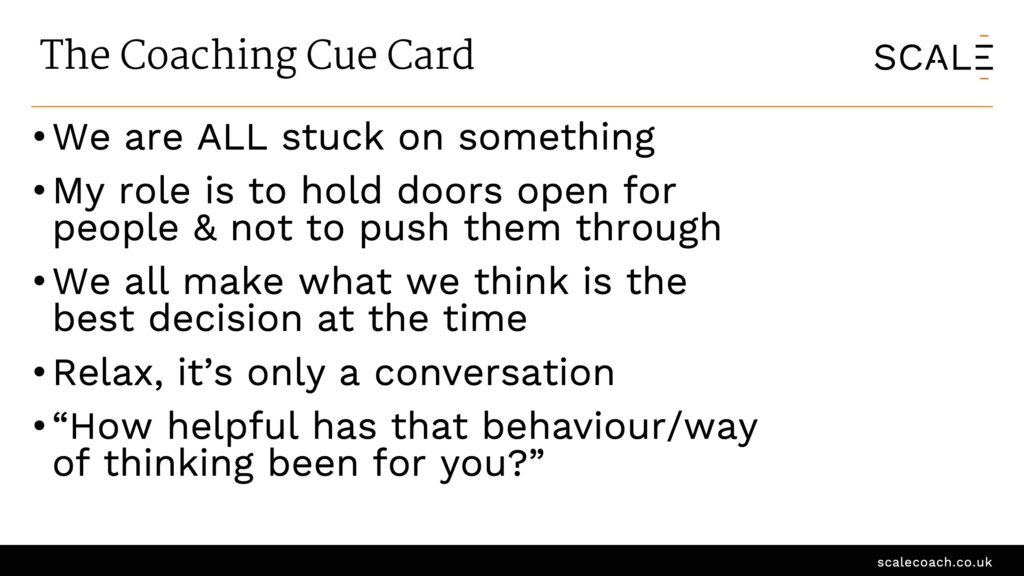If you want to take your coaching to the next level, then this article is for you.
Coaching is a valuable skill that you will develop and refine with experience. My personal journey began with coaching people in prison, guiding them into making the most daunting and challenging changes. Now a Team Coach at Scale, the reasoning behind my coaching is different but the key elements of coaching remain the same.
Drawing from over a decade of coaching experience, I have summarised 5 key points that I believe if incorporated, will instantly improve your approach and success in your coaching conversations. These 5 points form The Coaching Cue Card.

Every single one of us has something that we are stuck on and would benefit from being coached on. If somebody tells me that they are not facing a current problem, then their problem is that they are either not challenging themselves enough to become stuck, or they are not being open to admit to being stuck. Knowing this, we can tailor our responses to this barrier. For example, we can ask about the coachee’s priorities or interest in their current day-to-day tasks, as people who are not regularly being challenged at work are likely to feel bored. We could also ask about the last time they were stuck and who they spoke to about this.
Great questions open doors for exploration and allow people the opportunity to peer into and walk through that door if they wish. The heavier the door, the better our questioning needs to be. We can ask brilliant questions and help to set SMART goals, but what we cannot do is answer those questions or complete those goals for people. Do not worry if you think your great question was not answered, just because somebody did not respond does not mean they were not thinking of the answer. Planting seeds of thought can be just as powerful.
When people have asked me how I sat and listened to serious and sensitive crimes in my previous role, this is the best answer I can give. Focusing on the decisions and actions made by somebody rather than on the coachee as a person, helps us to remove judgement that can ruin a coach-coachee relationship.
It is easy to feel pressure when preparing for a coaching call. We want our coachees to have mind-blowing insights, and flood light, never mind light bulb, moments. A coaching conversation is just like any other conversation where it requires input and effort from both sides. Focussing too much on our desired outcome, rather than the journey of the conversation itself, can influence us into asking leading questions and trying to force learning from a coachee, which is not how any of us work.
This is a solid way of wording a question when getting someone to reflect on a behaviour or action. From experience, this is a simpler way of asking this type of question and it rarely generates a defensive response. Everybody knows if a behaviour or pattern of thinking is either helping us be the person we wish to be, or not.
I would encourage you to print off, or handwrite out a copy of this Coaching Cue Card and read through it in preparation for your next coaching call. I would also love to hear back from you and your experiences of using this resource. Contact me at Warrick@scalecoach.com.
There are also Scale Coaching virtual workshops being held throughout the year, join us as an introduction, or as a refresher. Click on the button below.
Happy Coaching!
Warrick
Interested to talk through any of these ideas?
Get in touch @ andy@scalecoach.co.uk
Get updates on special events.
Website design by PATTEN DESIGN